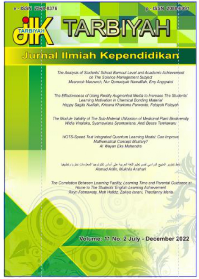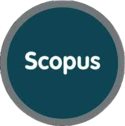HOTS-Speed Test Integrated Quantum Learning Model: Can Improve Mathematical Concept Mastery?
DOI:
https://doi.org/10.18592/tarbiyah.v11i2.7317Abstract
This study aims to improve mathematics learning outcomes (MLO) through the Quantum learning model integrated HOTS-Speed test. This research is classroom action research (CAR). The subjects of this study were 40 students of class XI Jasa Boga 1 SMK Pariwisata Harapan Denpasar for the academic year 2020/2021. This research was conducted in 2 cycles, where at the end of each cycle students were given an MLO test. The data collected in the next cycle was analyzed descriptively to calculate the average MLO score with a minimum success indicator of 75% minimum completeness criteria. From the analysis results obtained, the average score in the first cycle did not meet the indicators of success, while in the second cycle it had fulfilled so that the research was stopped in cycle 2. The conclusion of this study was that there was an increase in HBM through the application of the HOTS-Speed test integrated Quantum learning model. The increase in MLO occurs through changes in learning that researchers do. The HOTS-Speed test integrated Quantum learning model was able to improve students' MLO. Thus, the Quantum learning model assisted HOTS-Speed test is one solution in improving MLO.References
Acat, M. B., & Yusuf, A. Y. (2014). An investigation the effect of quantum learning approach on primary school 7th grade students’ science achievement, retention, and attitude. The International Journal of Research in Teacher Education, 5(2), 11-23.
Ardila, A., & Hartanto, S. (2017). Faktor yang mempengaruhi rendahnya hasil belajar matematika siswa MTS Iskandar Muda Batam. PYTHAGORAS: Jurnal Program Studi Pendidikan Matematika, 6(2).
Arianti, R., & Herwandi, H. (2018). Implementation of Quantum Teaching Models in Listening the Short Stories in SMA 2 Rambah Hilir (Penerapan Model Quantum Teaching Dalam Menyimak Cerita Pendek Di SMA Negeri 2 Rambah Hilir). Jurnal Gramatika: Jurnal Penelitian Pendidikan Bahasa Dan Sastra Indonesia, 4(2).
Cahyaningrum, A. D., Yahya, A. D., & Asyhari, A. (2019). Pengaruh model pembelajaran Quantum teaching tipe tandur terhadap hasil belajar. Indonesian Journal of Science and Mathematics Education, 2(3), 372-379.
Dewi, M. S. R., & Yarman, Y. (2019). Pengaruh Penerapan Model Pembelajaran Quantum Teaching terhadap Kemampuan Komunikasi Matematis Peserta Didik Kelas VIII SMPN 1 IV Koto Tahun Ajaran 2019/2020. Jurnal Edukasi dan Penelitian Matematika, 8(4), 84-89.
Dyah Kusuma, E., Gunarhadi, G., & Riyadi, R. (2018). The Development of Problem-Based Quantum Learning Model in Elementary Schoolin. International Journal of Educational Research Review, 3(3), 9-16.
Erfianti, L., Istiyono, E., & Kuswanto, H. (2019). Developing lup instrument test to measure higher order thinking skills (HOTS) Bloomian for senior high school students. International Journal of Educational Research Review, 4(3), 320-329.
Hamdi, S., Suganda, I. A., & Hayati, N. (2018). Developing higher-order thinking skill (HOTS) test instrument using Lombok local cultures as contexts for junior secondary school mathematics. REiD (Research and Evaluation in Education), 4(2), 126-135.
Hevriansyah, P., & Megawanti, P. (2017). Pengaruh kemampuan awal terhadap hasil belajar matematika. JKPM (Jurnal Kajian Pendidikan Matematika), 2(1), 37-44.
Hewi, L., & Shaleh, M. (2020). Refleksi hasil PISA (the programme for international student assesment): Upaya perbaikan bertumpu pada pendidikan anak usia dini. Jurnal Golden Age, 4(01), 30-41.
Jayantika, I. G. A. N. T., Parmithi, N. N. & Dyanawati, N. P. A. (2019). Quantum teaching learning model as solution to improve learning activity and mathematics learning outcome. In Journal of Physics: Conference Series (Vol. 1321, No. 2, p. 022119). IOP Publishing.
Kusno, K., & Purwanto, J. (2011). Effectiveness of quantum learning for teaching linear program at the Muhammadiyah Senior High School of Purwokerto in Central Java, Indonesia. Educare, 4(1).
Liestari, S. P., & Muhardis, N. F. N. (2020). Kemampuan Literasi Membaca Siswa Indonesia (Berdasarkan hasil UN dan PISA). Indonesian Journal of Educational Assessment, 3(1), 24-31.
Malik, A., & Afandi, M. (2020). Peningkatan Disiplin Dan Prestasi Belajar Pendidikan Agama Islam Melalui Model Pembelajaran Quantum Teaching Kelas VII MTS Nu Al Ishlah Binabaru. Jurnal Ilmiah Pendidikan Dasar, 7(1), 60–67.
Mansur, N. (2018). Melatih literasi matematika siswa dengan soal PISA. Prisma, Prosiding Seminar Nasional Matematika, Vol. 1, 140-144.
Murnawan, I. K. (2021). Penerapan Model Pembelajaran Quantum teaching untuk Meningkatkan Hasil Belajar Matematika. Journal of Education Action Research, 5(2), 254-262.
Nabillah, T., & Abadi, A. P. (2020). Faktor penyebab rendahnya hasil belajar siswa. Prosiding Sesiomadika, 2 (1c).
Nirwana, N. (2017). Penggunaan Media Komputer untuk Meningkatkan Proses dan Hasil Belajar melalui Model Pembelajaran Kuantum Learning pada Mata Kuliah Filsafat Matematika Mahasiswa S2 Prodi Matematika Fkip Universitas Bengkulu. Jurnal Pendidikan Matematika Raflesia, 2(2).
Riati, T., & Farida, N. (2017). Pengaruh model pembelajaran Quantum learning terhadap kemampuan pemecahan masalah matematika siswa kelas VIII SMP PGRI 02 Ngajum. Pi: Mathematics Education Journal, 1(1), 15-21.
Riyanti, Y., Wahyudi, W., & Suhartono, S. (2021). Pengaruh kemandirian belajar terhadap hasil belajar matematika siswa sekolah dasar. Edukatif: Jurnal Ilmu Pendidikan, 3(4), 1309-1317.
Sagala, P. N., & Andriani, A. (2019). Development of higher-order thinking skills (HOTS) questions of probability theory subject based on Bloom’s taxonomy. In Journal of Physics: Conference Series (Vol. 1188, No. 1, p. 012025). IOP Publishing.
Santoso, E. (2016). Pengaruh penggunaan model pembelajaran Quantum terhadap kemampuan berpikir kritis matematika siswa. Jurnal Cakrawala Pendas, 2(1), 55-69.
Serevina, V., Sari, Y. P., & Maynastiti, D. (2019). Developing high order thinking skills (HOTS) assessment instrument for fluid static at senior high school. In Journal of Physics: Conference Series (Vol. 1185, No. 1, p. 012034). IOP Publishing.
Widyaningsih, S. W., Yusuf, I., Prasetyo, Z. K., & Istiyono, E. (2021). The Development of the HOTS Test of Physics Based on Modern Test Theory: Question Modeling through E-Learning of Moodle LMS. International Journal of Instruction, 14(4), 51-68.
Yanto, A. (2018). Upaya Meningkatkan Pemahaman Konsep Melalui Model Pembelajaran Quantum Teaching. Indonesian Journal of Learning Education and Counseling, 1(1), 11-16.
Yosefa, B., & Nurjanah, E. (2013). Pengaruh metode pembelajaran Quantum teaching dengan menggunakanmind mapping terhadap kemampuan penalaran matematis pada siswa smp kelas VIII. Jurnal Pengajaran MIPA, 18(2), 146-151.
Downloads
Published
How to Cite
Issue
Section
License
Authors retain copyright and grant the journal right of first publication with the work simultaneously licensed under a Creative Commons Attribution 4.0 International License that allows others to share the work with an acknowledgment of the work's authorship and initial publication in this journal.




